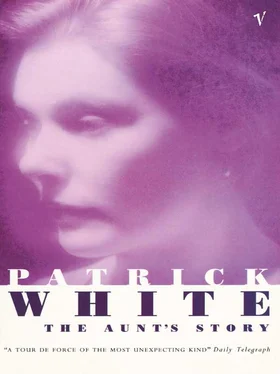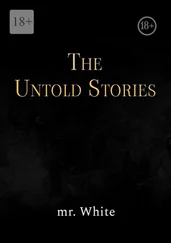‘Where have you been, Theodora?’ Mrs Goodman asked.
‘Walking, Mother.’
‘And whom did you see?’
Mrs Goodman flung her grammar like a stone.
‘I did not see a cat,’ said Theodora.
Mrs Goodman looked at her daughter, who giggled before she left the room.
At this point, Theodora sometimes said, I should begin to read Gibbon, or find religion, instead of speaking to myself in my own room. But words, whether written or spoken, were at most frail slat bridges over chasms, and Mrs Goodman had never encouraged religion, as she herself was God. So it will not be by these means, Theodora said, that the great monster Self will be destroyed, and that desirable state achieved, which resembles, one would imagine, nothing more than air or water. She did not doubt that the years would contribute, rubbing and extracting, but never enough. Her body still clanged and rang when the voice struck.
‘Theo- dor -a!’
I have not the humility, Theodora said.
But on a morning the colour of zinc old Mrs Goodman died.
Theodora took the paper, pushed under the door by the man in braces, and which began all mornings. Her feet were flat in the hall. There had been a murder at Cremorne, and some vehemence about the throwing of a cricket ball, by one cricketer at another, in a match somewhere. On the top stair, which had frayed, Theodora bent to pull the thread. After many years this patch had gone too far. Theodora pulled, but, bending, began to listen to the silence in the house. It was the silence of silence that her heart began to tell. Her fingers ripped the coarse thread from the stair. Holding her breath for a wrench of hiccups that did not come, she went into the room. She is dead, she said, she has died in her sleep. Old Mrs Goodman had died, of course, without her teeth. Her lips had sunk in on her gums, leaving her with a final expression that was gentle, and prim, and uncharacteristically silly. Theodora folded the hands of death. Her breath fell stubbornly, thicker, faster, into the room. She did not cry. On the contrary, she ran downstairs, so fast that she was afraid her body might hurtle ahead. When she stood on the back steps, she was still not sure what she would do, whether it would be something ridiculous and shameful, or tragic and noble.
‘Mornin’, Miss Goodman,’ said Mr Love, who was tying an intervening vine on his side of the common fence.
‘Good morning, Mr Love,’ said Theodora Goodman.
Mr Love had some kind of pension, and a rupture, and a nephew in New Guinea, and a fawn pug with brown points called Puck.
‘There has been a vile murder in Cremorne,’ said Mr Love.
Mr Love was quiet, and he almost always wore sandshoes, so that his sympathy, Theodora knew, would be reverent and rubber-soled.
‘Yes,’ she said, ‘I know.’
But she did not know, even now, what next.
She knew that death can destroy, and she had herself died once, at cockrow, in a crumbling of stone and a scattering of ashes. But she could not die again for this old woman who had been her mother, who deserved pity and a few tears, if only for her teeth, suspended in an endless china smile in a glass beside the bed.
Ah, said Theodora, I shall tell Mr Love, and he will know to say the decent and sad-sounding words.
But she hesitated still, with her tongue between her lips. She clenched her hands. She would possess the situation alone, entirely, firmly, a few moments longer. She held her mother in her hand.
‘BUT, my darling,’ said Theodora Goodman, ‘there is very little to tell.’
She felt the pressure of the child, almost as slight as paper on her side, her breath that was almost her own. Her own arm round the child was a formal gesture of protection, scarcely flesh. Now that they approached the hour of the funeral, Theodora was exhausted, as if she had carried more than the burden of the dead.
‘Will you really go away, Aunt Theo?’ asked Lou.
‘Yes,’ said Theodora. ‘I shall go away.’
‘Then there will soon be a lot of other stories to tell.’
‘I expect not,’ Theodora said.
‘Why?’ asked Lou.
‘Because there are the people who do not have many stories to tell.’
There were the people as empty as a filigree ball, though even these would fill at times with a sudden fire.
‘Now you must sit up, Lou,’ she said. ‘You are heavy.’
‘I wish …’ said Lou.
‘What do you wish?’
‘I wish I was you, Aunt Theo.’
And now Theodora asked why.
‘Because you know things,’ said Lou.
‘Such as?’
‘Oh,’ she said, ‘things.’
Her eyes were fixed, inwardly, on what she could not yet express.
‘Either there is very little to learn, or else we learn very little,’ said Theodora. ‘You will discover that in time.’
‘But perhaps if I live to be very old,’ said Lou. ‘Like a tortoise, for instance.’
So that Theodora was forced to agree.
The child shivered for the forgotten box, which she had not seen, but knew.
‘If I do not die,’ she said.
Theodora looked down through the distances that separate, even in love. If I could put out my hand, she said, but I cannot. And already the moment, the moments, the disappearing afternoon, had increased the distance that separates. There is no lifeline to other lives. I shall go, said Theodora, I have already gone. The simplicity of what ultimately happens hollowed her out. She was part of a surprising world in which hands, for reasons no longer obvious, had put tables and chairs.
Henceforward we walk split into myriad fragments, like an insect with a hundred feet, a centipede with soft-stirring feet that drinks in the atmosphere; we walk with sensitive filaments that drink avidly of past and future, and all things melt into music and sorrow; we walk against a united world, asserting our dividedness. All things, as we walk, splitting with us into a myriad iridescent fragments. The great fragmentation of maturity.
HENRY MILLER
THEODORA Goodman sat in the hall near the reception desk and waited for somebody to come. She had waited she did not know how long, without caring, among the linoleum squares. These were an old yellow-brown. I can wait here very much longer, Theodora said. Labels were plastered on her luggage, but her face was bare. There are the faces that do not belong particularly anywhere and which, for that reason, can rest unquestioned. Theodora looked at her labels, at all those places to which apparently she had been. In all those places, she realized, people were behaving still, opening umbrellas, switching off the light, singing Wagner, kissing, looking out of open windows for something they had not yet discovered, buying a ticket for the metro, eating salted almonds and feeling a thirst. But now that she sat in the hall of the Hôtel du Midi and waited, none of those acts was what one would call relevant, if it ever had been. She touched the old dark ugly furniture that had a dark and lingering smell of olives, the same sombre glare. There is perhaps no more complete a reality than a chair and a table. Still, there will always also be people, Theodora Goodman said, and she continued to wait with something of the superior acceptance of mahogany for fresh acts.
Somewhere among her things, perhaps in the leather writing case she had been obliged to buy on the Ponte Vecchio, Theodora still had the brochure in which the management of the Hôtel du Midi hinted glossily at luxe . Now she was glad that things are rarely as described. Reality reduced the Hôtel du Midi from solitary splendour to a tight fit, between a garage and a confiserie . The Hôtel du Midi wore vines and a frill or two of iron. There were the blinds that furled and unfurled still, and the blind that evidently had stuck. Smells came in at the door, petrol and oil, fish, sea, and the white negative smell of dust. A clock ticked, prim and slow, a clock with a fat, yellow, familiar face, removed brutally from somebody’s house and exposed to the public hall of a hotel. Somewhere, Theodora remembered, there would also be the jardin exotique . She considered its possibility, smiling for her own weakness. It was this, no doubt, that had helped her to decide, why the Hôtel du Midi, and not du Sud, de l’Orient, Belle Vue, or de la Gare, neither Menton, nor Cannes, nor Saint Tropez, but just here. Somewhere at the back, unsuspected, without the assistance of the management’s brochure, fantastic forms were aping the gestures of tree and flower. Theodora listened to the silence, to hear it sawn at by the teeth of the jardin exotique , but instead feet began to come down the passage.
Читать дальше












